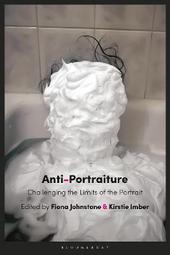
|
Anti-Portraiture: Challenging the Limits of the Portrait
Paperback / softback
Main Details
| Title |
Anti-Portraiture: Challenging the Limits of the Portrait
|
| Authors and Contributors |
Edited by Fiona Johnstone
|
|
Edited by Kirstie Imber
|
| Physical Properties |
| Format:Paperback / softback | | Pages:232 | | Dimensions(mm): Height 234,Width 156 |
|
| Category/Genre | Theory of art |
|---|
| ISBN/Barcode |
9781350284197
|
| Classifications | Dewey:306.47 |
|---|
| Audience | | Tertiary Education (US: College) | |
|---|
| Illustrations |
20 bw illus
|
|
Publishing Details |
| Publisher |
Bloomsbury Publishing PLC
|
| Imprint |
Bloomsbury Visual Arts
|
| Publication Date |
30 June 2022 |
| Publication Country |
United Kingdom
|
Description
The portrait has historically been understood as an artistic representation of a human subject. Its purpose was to provide a visual or psychological likenesses or an expression of personal, familial or social identity; it was typically associated with the privileged individual subject of Western modernity. Recent scholarship in the humanities and social sciences however has responded to the complex nature of twenty-first century subjectivity and proffered fresh conceptual models and theories to analyse it. The contributors to Anti-Portraiture examine subjectivity via a range of media including sculpture, photography and installation, and make a convincing case for an expanded definition of portraiture. By offering a timely reappraisal of the terms through which this genre is approached, the chapter authors volunteer new paradigms in which to consider selfhood, embodiment and representation. In doing so they further this exciting academic debate and challenge the curatorial practices and acquisition policies of museums and galleries.
Author Biography
Fiona Johnstone is an art historian, researcher and lecturer, specialising in the modern and contemporary period, with a focus on the intersections between art and visual culture and the medical humanities. She is Associate Lecturer in Cultural & Contextual Studies (Photography) at Middlesex University, UK. She has also worked at Durham University, the University of Warwick, Imperial College London, University of the West of England, University of the Arts London and Birkbeck, University of London, UK. Kirstie Imber is Sessional Lecturer in the History of Art & Screen Media at Birkbeck, University of London, UK, where she was previously Associate Research Fellow. Her research interests include the censorship of art, the intersection of law and cultural practices in the UK, and contemporary Iranian art.
ReviewsThis book considers conceptual portraits, which are experimental and emphasize symbolic meanings rather than physical appearances. Some of the art in this book is conventional painting, drawing, sculpture, and photography, but most of it is innovative. * CHOICE * This collection of essays by experts from the arts and literature provides important insights into the reconceptualization of portraiture in recent decades. Understood as critique rather than as acquiescence, the portrait-or rather the anti-portrait-becomes a terrain for reimaging the implications of new media and new questions for asserting, or abstracting, human likeness. In this nuanced anthology Fiona Johnstone and Kirstie Imber demonstrate the elasticity and resilience of portraiture not as a genre but as a politics. * Anne Collins Goodyear, Co-Director, Bowdoin College Museum of Art, USA * Modern and contemporary artists have for some time been challenging conventions of figurative portraiture by representing their subjects in unusual ways - using, for instance, evocative objects, indexical traces or words. Factors that have contributed to this movement include the impact of psychoanalytic and post-structuralist theories that have called into question notions of a singular personal identity, the rise of photography, as well as artists' efforts to reveal something that eludes figurative depiction. This book offers an engaging overview of 'anti-portraiture' with a wide-ranging general introduction and a number of excellent more sharply focused chapters by experts in the field. * Margaret Iversen, Professor Emerita, University of Essex, UK *
|